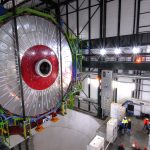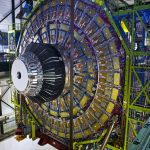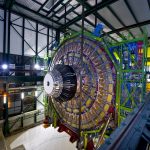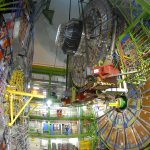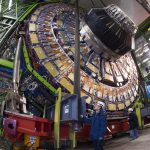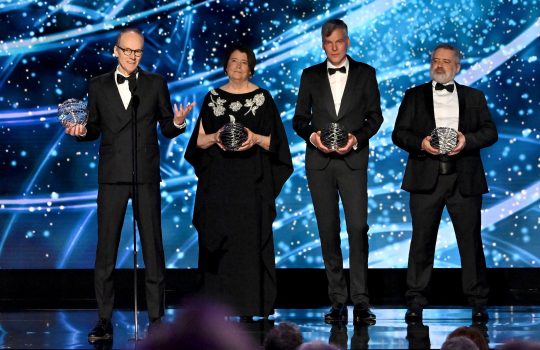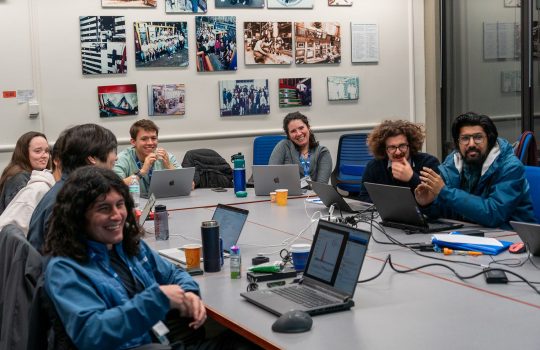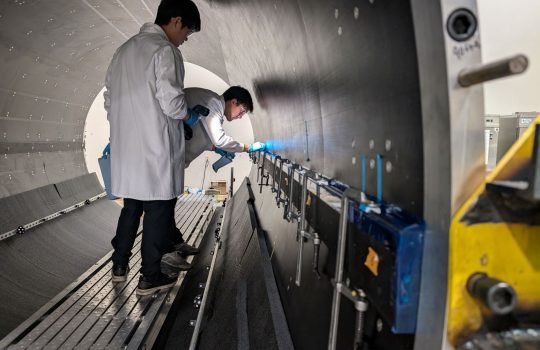Batavia, Ill. – Early yesterday morning (Jan. 22), scientists of the U.S. CMS collaboration joined colleagues around the world to celebrate the lowering of the final piece of the Compact Muon Solenoid detector into the underground collision hall at CERN in Geneva, Switzerland. The near completion of the CMS detector marks a pivotal moment for the international experiment, in preparation for the start-up of the Large Hadron Collider this summer.
CMS has approximately 2,300 international collaborators. Supported by the Department of Energy and the National Science Foundation, the U.S. CMS collaboration consists of roughly 500 physicists from 48 U.S. universities and Fermilab. The U.S. is the largest single national group in the experiment, and DOE’s Fermilab is the host laboratory for the U.S. CMS collaboration.
CMS is the first experiment of its kind to be constructed above ground and then lowered, piece by piece, into a cavern 300 feet below. This final piece is a large disk, nearly 45 feet in diameter, with an asymmetrical cap on one face that fits into the central barrel of the experiment. The whole assembly weighs approximately 1,430 tons. It includes fragile detectors that will help identify and measure the energy of particles created in LHC collisions. After eight years of work in the surface hall, the lowering of this final piece moves CMS into its final commissioning stage.
“We have been building the CMS detector for nearly a decade, and now we’re 99.8 percent done,” said Fermilab physicist Dan Green, construction project manager for US CMS and CMS collaboration board chair-elect. “The first collisions are just around the corner.”
For this last large piece, scientists at the University of Wisconsin-Madison designed the large iron disks that help guide the magnetic field created by the detector’s powerful solenoid magnet. “From the design to the construction, we were involved all the way,” said physicist Dick Loveless from the University of Wisconsin-Madison, who watched as the huge gantry crane lowered the disk. “It was phenomenal to see this last piece go down. Everything went down without excitement, which is exactly what we want.” Fermilab and U.S. universities designed and built the cathode strip chambers that are bolted onto the disks. These chambers accurately track muons, the heavier versions of electrons that indicate interesting collisions. U.S. funding also contributed to the plastic scintillating layers and all the electronics in the hadron calorimeter, part of which is the “nose” of the disk that absorbs and measures energies of all particles flying through the detector.
From shedding light on dark matter to searching for extra dimensions of space, experiments at the LHC promise to unlock some of the deepest mysteries of the universe. “This is a very exciting time for physics,” said CMS spokesman Tejinder Virdee. “The LHC is poised to take us to a new level of understanding of our universe.”
Data taking will begin for the CMS experiment in the summer of 2008.
- Scientists first constructed and tested the CMS detector in an above-ground assembly building. Image courtesy of Michael Hoch, Adventure Art
- CMS scientists position the final piece of the detector above the shaft and begin to lower it into the underground collision hall, 300 feet below. Image courtesy of CERN
- Going down! Collaboration members watch the last piece of the detector go underground. Image courtesy of CERN
- This final piece weighs 1,430 tons and measures roughly 45 feet in diameter. Image courtesy of Michael Hoch, Adventure Art
- Touch down. Now that the final piece is underground, final commissioning will begin on the CMS detector. Image courtesy of CERN
Notes for editors:
Video is available at:
http://cmsinfo.cern.ch/outreach/cmseye/yemin1_lowering.htm
The United States contributions to the CMS experiment and the Large Hadron Collider are funded by the Department of Energy’s Office of Science and the National Science Foundation.
CERN is the European Organization for Nuclear Research, with headquarters in Geneva, Switzerland. At present, its Member States are Austria, Belgium, Bulgaria, the Czech Republic, Denmark, Finland, France, Germany, Greece, Hungary, Italy, Netherlands, Norway, Poland, Portugal, Slovakia, Spain, Sweden, Switzerland and the United Kingdom. India, Israel, Japan, the Russian Federation, the United States of America, Turkey, the European Commission and UNESCO have Observer status.
Fermi National Accelerator Laboratory is the host laboratory for the US CMS Collaboration. Fermilab is a Department of Energy National Laboratory operated under a contract with DOE by the Fermi Research Alliance.
US CMS member institutions
(48 institutions, from 22 states and Puerto Rico)
California
California Institute of Technology, Pasadena
Lawrence Livermore National Laboratory, Livermore
University of California, Davis
University of California, Los Angeles
University of California, Riverside
University of California, San Diego
University of California, Santa Barbara
Colorado
University of Colorado, Boulder
Connecticut
Fairfield University, Fairfield
Florida
Florida Institute of Technology, Melbourne
Florida International University, Miami
Florida State University, Tallahassee
University of Florida, Gainesville
Illinois
Fermi National Accelerator Laboratory, Batavia
Northwestern University, Evanston
University of Illinois at Chicago
Indiana
Purdue University, West Lafayette
Purdue University Calumet, Hammond
University of Notre Dame, Notre Dame
Iowa
University of Iowa, Iowa City
Kansas
Kansas State University, Manhattan
University of Kansas, Lawrence
Maryland
Johns Hopkins University, Baltimore
University of Maryland, College Park
Massachusetts
Boston University, Boston
Massachusetts Institute of Technology, Cambridge
Northeastern University, Boston
Minnesota
University of Minnesota, Minneapolis
Mississippi
University of Mississippi, Oxford
Nebraska
University of Nebraska, Lincoln
New Jersey
Princeton University, Princeton
Rutgers, The State University of New Jersey, Piscataway
New York
Cornell University, Ithaca
Rockefeller University, New York
State University of New York at Buffalo
University of Rochester, Rochester
Ohio
Ohio State University, Columbus
Pennsylvania
Carnegie Mellon University, Pittsburgh
Puerto Rico
University of Puerto Rico, Mayaguez
Rhode Island
Brown University, Providence
Tennessee
University of Tennessee, Knoxville
Vanderbilt University, Nashville
Texas
Rice University, Houston
Texas A&M University, College Station
Texas Tech University, Lubbock
Virginia
University of Virginia, Charlottesville Virginia Polytechnic Institute and State University, Blacksburg
Wisconsin
University of Wisconsin, Madison

